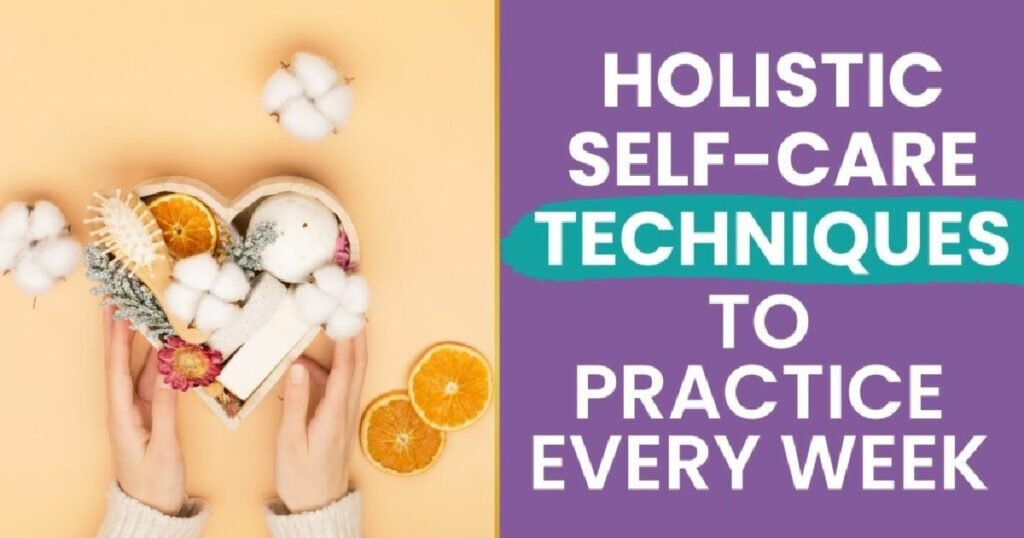Introduction
What is self-care?
A holistic self-care approach to the mind, body, and spirit This type includes yoga, and these are practices that help to cultivate healthiness in the physical body, create emotional stability, and aid a conscious shift into higher self-consciousness. Now more than ever in this monstrously babyish century of ours is it critically critical to us with our speed-of-light dogmas and short attention spans. a deadly global pandemic. Doing this every day, multiple times a week is one way to live more healthier and happier but also balanced.
Types and Categories
Physical Self-Care
Ensuring the body continues to be healthy is a form of physical self-care. This involves exercise nutrition, holistic self-care, and sleep.
Exercise
That really simple fact is that exercising makes u feel great and look great while allowing you to live a longer healthier life. A well-rounded package would include a mix of cardio and resistance training as well as flexibility exercises.
Nutrition
This will give you all the things for energy, growth, holistic self-care, and repair that nature intended with a balance of fresh whole foods. General Health: A diet with various fruits, vegetables, and proteins is generally best for your health.
Sleep
Naked Twitter picture showed us sleeping naked on Twitter with clothes on…—Quality sleep is crucial for our physical health. This is because it gives the body the chance to heal and the brain time for processing from the left side of your system. By developing a proper sleep schedule, and managing your bedroom environment where you can relax peacefully would aid in a higher quality of sleep.
Emotional Self-Care
Emotional self-care refers to recognizing and honoring your feelings, controlling stress, and giving yourself the same body you would give a friend.
Stress Management
Some holistic self-care and relaxation techniques like yoga, meditation or even deep breathing exercises if done correctly can help in better stress management.
Emotional Expression
It bears no fruit to leave the clinics and bottle all your emotions, sometimes expression is key so whichever way you are comfortable process those feelings; through journaling, talking to a trusted friend, or indulging in other forms of creativity.
Mindfulness
Clear your head and be present, it’s easier to concentrate on what is happening now. Meditation, mindful breathing, and walking can reduce the problems of emotional resilience.
Mental Self-Care
Mental self-care – cognitive and mental health.
Cognitive Exercises
Bringing and using those brain teaser puzzles to stimulate the brain, and reading books for learning or enjoyment reasons also help in keeping a sharp mind.
Mental Health Awareness
Everyone must learn about mental health and recognize these signs of a serious nature before help or support is given.
Learning and Growth
Education and development provide a feeling of accomplishment and fulfillment. Engaging in hobbies and other interests, like using services such as Wake Forest Golf Lesson can keep you on a path of positive behaviors that contribute to mental health.
Spiritual Self-Care
From prayer to finding satisfactory meaning in life spiritual self-care is of you trying to deepen your connection with God and deeper within yourself.
Meditation and Prayer
Meditation and prayer practices can give you a feeling of peace, calm, or connection to something greater inside of yourself.
Connection with Nature
Walking, gardening, and spending time at a park allow for a restorative connection to nature. Helps develop a sense of awe
Spiritual Communities
Becoming part of a spiritual/religious community can help us find support, shared values, and a belief in the power of something much greater than ourselves.
Social Self-Care
Social self-care is centered around creating and nurturing connections with other people at home, work, or in life.
Relationships and Connections
Relationships with friends, family, and professional colleagues provide emotional nourishment which makes for a full life.
Community Involvement
Being involved in other events within the community or participating as a volunteer can help you feel so much more connected and have some real purpose.
Social Media Management
With social self-care, it is important not to let the presence of social media outweigh its benefits and detriment to mental health.
Environmental Self-Care
Environmental self-care revolves around preparing and maintaining a healthy, nurturing area in which we can live.
Living Space Organization
For furthering and cleaning out areas tidy effect on stress reduction, especially allowing a calming atmosphere to occupy the space.
Sustainable Living Practices
The more we recycle, the. lessen waste: good for our planet = guide us individually
Interacting Naturally
Activities such as hiking, camping or simply visiting a park are an opportunity to engage with natural environments and promote physical health.
Symptoms and Signs of Neglect
Physical Symptoms
If you ignore self-care, in fact, over time it can manifest as different physical symptoms such as exhaustion or energy imbalance (being either overweight or underweight), and even chronic illness.
Fatigue
Continuous exhaustion or energy loss can be a symptom of inadequate self-care.
Weight Fluctuations
Sudden weight gain or loss: bad eating habits and stress.
Chronic Illnesses
Self-neglect: ignoring health which will become high BPC, diabetes, or heart disease.
Emotional Symptoms
Disregarding emotional needs can give rise to anxiety, depression, mood swings, and even burnout.
Anxiety and Depression
More often than not, frequent feelings of concern or sadness are signals of emotional negligence.
Mood Swings
If you find mood swings coming out of nowhere, all your emotions are bottled up inside and dormant.
Burnout
When energy is no longer accessible and a sense of personal fulfillment runs on empty, burnout can develop in response to one-too-many stressors.
Mental Symptoms
Ignoring mental health can lead to concentration problems, lack of memory retention as well as not feeling motivated.
Difficulty Concentrating
Difficulty concentrating on things may either be due to stress or mental exhaustion.
Memory Issues
Common cognitive stressors include forgetting important information or experiencing memory lapses.
Lack of Motivation
One of the greatest alarms that mental health has been left behind by life is when you lose interest in activities, once loved.
Spiritual Symptoms
If our humanity is ignored, we feel disconnected from the self; without a spiritual life, it feels meaningless and barren as though some part of us has withered away.
Feeling Disconnected
Spiritual desolation will bring about a feeling of isolation and disconnection, be it from oneself or others.
Lack of Purpose
If you are feeling lost or without direction, it is likely due to a lapse in spiritual care.
Inner Conflict
You might be experiencing spiritual unrest if you are having a hard time grappling with your own beliefs or what it is that YOU value.
Social Symptoms
When you neglect social self-care, the impact is commonly as follows: loneliness > relationship conflicts > then looking increasingly like a recluse in his or her home.
Loneliness
Social Neglect: Isolation is a common sign of social neglect.
Relationship Conflicts
If you constantly argue or feel like people do not understand your feelings, this means that your social self-care needs help.
Social Withdrawal
Isolating yourself from social life or activities may be telling you that your (perhaps only a few) social needs are not being met.
Causes and Risk Factors
Lifestyle Choices
For example, your lifestyle can make a big difference in how healthy you feel.
Poor Diet
Being malnourished is only likely to impair your physical and mental function.
Sedentary Lifestyle
Poor exercise and inadequate physical activity can lead to all sorts of health issues like obesity, and cardiovascular disease.
Excessive Screen Time
Too much screen time can also make you more prone to eyestrain, affect your posture, and even reduce how often you move around.
Environmental Factors
Environmental impacts are an essential part of self-care as a whole.
Pollution
Pollutants can damage our physical health and contribute to respiratory problems.
Work Environment
Mental and emotional health deteriorate in a stressful or unsupportive work environment.
Home Environment
No one wants to live in a mess and it has been proven that clutter can lead directly to depression.
Psychological Factors
The role of mental and emotional factors in self-care is not insignificant.
Stress
Long-term stress causes a series of health problems and makes self-care difficult.
Trauma
Trauma from the past can affect one’s present self-care routines and psychological well-being.
Mental Health Conditions
Things like anxiety, depression, or bipolar disorder are conditions that have to be managed with community checkpoints set firmly in the reminders of self-care.
Diagnosis and Self-Assessment
Common Diagnostic Tools
There are different tools and methods to measure the need for this whole self-care.
Self-Assessment Quizzes
Online questionnaires may reveal neglected areas and hence more about what self-care can do now.
Professional Evaluations
Evaluation and consultation with healthcare professionals for your self-care needs is a great place to start.
Monitoring Apps
Health and wellness apps that can monitor behavior to give insights on where you need improvement.
Personal Reflections
Self-reflection and interpretation of our own experiences in life are vital.
Journaling
By writing about daily life and emotions, you can detect certain paths to follow or areas that need attention.
Being Mindful:
It makes you more conscious of your thoughts, feelings, and sensations in the body.
Feedback from Others
Obtaining feedback from trusted friends or mentors can encourage an outside perspective on self-care practices.
Treatment Options
Professional Treatments
Several professional treatments are available to enhance self-care.
Therapy and Counseling
Speaking with someone like a therapist or counselor can help provide backup and more tools in your self-care toolbox.
Medical Interventions
Some health conditions require medical treatment, such as medication or physical therapy.
Alternative therapies
Alternative therapies, including everything from acupuncture to massage or an herbal supplement that could complement traditional treatments, can be considered.
Self-Care Routines
Self-care routines assist in the journey of well-being.
Daily Rituals
Small daily activities make for good self-care and help to improve our overall health.
Scheduled Breaks
Regular periods of rest during the day can help prevent burnout and preserve your ability to stay productive.
Relaxation Techniques
When experiencing mood swings, take steps to help reduce stress and promote relaxation deep breathing (in through your nose for 2 counts; hold for 4), progressive muscle relaxation, or guided imagery.
Community Resources
Using the community can make self-care easier
Support Groups
Support Groups that are not “bound” by one geographic location: support groups can be a helpful way to feel connected with those who empathize and relate.
Workshop and Seminars
Author Workshop and Seminar Attendance Attending devices at workshops, will provide you with a novel self-care model.
Online Forums
Consider also joining online forums that can offer support and insight from an even larger community.
Preventive Measures
Daily Habits
What you do daily purposefully, is the key to avoiding health challenges.
Regular Exercise
Following a routine of regular physical exertion contributes to sound health and reduces the chances of acquiring chronic diseases.
Healthy Eating
Healthy eating promotes good health and helps prevent deficiencies in our diet.
Consistent Sleep Schedule
Sleeping on a schedule allows you to sleep better and keep your health in check.
Stress Management
One must learn to handle stressful situations if one wants their emotions and mind to be healthy.
Relaxation Techniques
Learning relaxation methods can lessen stress and improve well-being.
Time Management
With time-management skills, one can effectively sort out the priorities in life and manage all responsibilities that come along without any stress!
Hobbies and Interests
Doing things that you like, hobby, or have interests in feeling pleasant and light.
Building Resilience
They have an understanding of what resilience is – the stability in their ability to bounce back after being hit by life.
Positive Thinking
Positive thinking can boost mood and outlook on life.
Coping Strategies
One of those coping mechanisms that help you better manage stress, and lemons is our most potent to date Love Potion #01974 -TAKEA SEAT.ALREADY.
Support Networks
A powerful support group means that you have people on your side who will help you face difficulties.
A large number of people and cases
Success Stories
Real-World Success Stories that Prove the Merits of Holistic Self-Care
Personal Transformation
Those who have adopted a holistic approach to taking care of themselves often find that they make significant improvements in their health and lifestyle.
Overcoming Challenges
Learning about others who have overcome adversity will help keep you inspired and motivated.
Long-Term Benefits
It is through these success stories that you will often see the fruits of maintaining self-care practices holistically.
Challenges Faced
Learning what has been difficult for others provides elegant solutions to unimaginable problems.
Initial Struggles
A LOT of people hit a hurdle or two when first starting on their self-care journey.
Common Setbacks
By reading up on some of the most common setbacks, you can ready yourself to counter or resolve issues as they arise.
Learning from Failures
However, failures can give us invaluable lessons and also are the stepping stone of our best next success.
Expert Insights
Medical Professionals’ Advice
Tips from medical professionals could help refine your self-care practices.
General Practitioners
GPs can do all of the hereinafter mentioned services, including health assessments and individual advice.
Psychologists
In a way, psychologists tell you strategies for emotional and mental well-being as one of the best self-care tips.
Nutritionists
Only a nutritionist can design healthy diets that suit your body.
These are the insights of holistic practitioners.
While allopaths have a more conventional view of self-care, holistic practitioners opened up other avenues.
Yoga Instructors
Yoga teachers can facilitate the practice of physically and mentally caring for oneself through yoga.
Meditation Guides
There are also meditation guides, who know ways you can turn to for your spiritual well-being and mindfulness.
Wellness Coaches
Wellness coaches offer customized plans and help in living a balanced life.
Research and Studies
Self-care practices evidence, through scientific research and studies.
Scientific Findings
The effectiveness of specific self-care practices could be supported by research.
Case Studies
Case studies provide an in-depth look at individual self-care management interventions and results.
Evidence-Based Practices
By encouraging the application of evidence-based practices self-care efforts are proven, and hence beneficial.
Conclusion
Practicing holistic self-care is a whole-person approach that nourishes the mind, body, and soul. Such practices must come from aspects of their life including physical, emotional, mental, spiritual, and more. As always, we must help to lift one another and remember – self-care is not an indulgence but compulsory in simple terms of health and general well-being. Incorporate these practices today, into your daily routine and feel the holistic magic of self-care.
Learn about sedentary lifestyle




